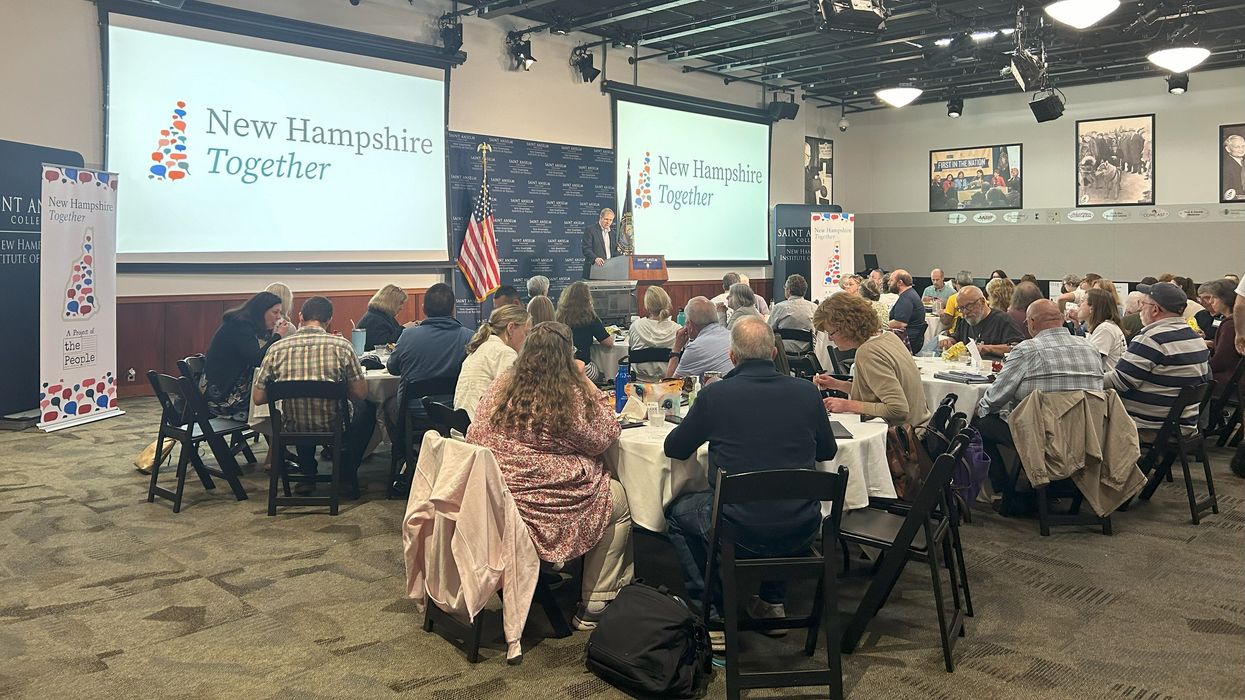Becvar is co-publisher of The Fulcrum and executive director of the Bridge Alliance Education Fund. Nevins is co-publisher of The Fulcrum and co-founder and board chairman of the Bridge Alliance Education Fund.
The recent work of the New Hampshire Together citizens assembly offers a model for how we can restore faith in our democratic institutions and improve civic engagement through nonpartisan deliberation and actionable reforms.
The citizens assembly, which convened in Manchester in June, brought together 50 New Hampshire residents representing a cross-section of the state’s demographics and political ideologies. Their goal was ambitious: to explore ways to rebuild trust in elections, reduce partisan polarization and increase the responsiveness of the political system to the will of the people.
Over three days of discussion and debate, the participants achieved something that has become increasingly rare in today’s political landscape — they found common ground. By the end of the event, supermajorities supported four key recommendations.
Redistricting: A fairer process
The proposal to emerge from the assembly with the highest level of support (89 percent) was the creation of an independent redistricting commission. By ensuring that district lines are drawn by a nonpartisan body rather than political incumbents, New Hampshire could take a significant step toward restoring fairness in its elections. The commission would work to ensure these districts would be compact, avoiding irregular shapes and keeping communities intact.
Voter education: Informed citizens, informed decisions
The second recommendation focuses on improving voter education, supported by 87 percent of the assembly participants. The proposal calls for creating a nonpartisan working group to collaborate with the New Hampshire secretary of state's office to increase voter awareness about election laws, policies and procedures.
This includes better publicizing election integrity measures, enhancing town websites, disseminating educational materials and making election data (e.g., audits and voter registration statistics) easily accessible. The goal is to foster transparency and trust in the electoral process.
Primary reform: A single ballot for a less polarized election
A recommendation that garnered 85 percent support was the introduction of a “single ballot” primary. In this system, all properly registered candidates would be listed on one ballot, with the option for candidates to include their party affiliation if they choose. This reform is intended to open up the primary process, making it more inclusive by eliminating the requirement for voters to declare a party affiliation in order to participate.
This new system would be accompanied by a comprehensive voter education campaign.
Civics education: Building the next generation of engaged citizens
The final recommendation was to establish a Civics Education Advisory Board to improve civics education for students from pre-kindergarten through 12th grade. The 83 percent support for this recommendation highlights the broad recognition that reinvigorating civics education is essential for fostering engaged and informed future voters.
A comprehensive civics curriculum would teach students not just the mechanics of government, but also their rights and responsibilities as citizens. The curriculum would cover practical skills such as how to register to vote, participate in elections, lobby for issues and engage in civic representation. The assembly emphasized the need for an interdisciplinary approach, where civics education is integrated across subjects and evaluated using proficiency standards similar to those applied in English, math and science.
Next steps
The New Hampshire Together citizens assembly’s work is far from over. Its delegates, along with a bipartisan group of legislators, are now tasked with turning these recommendations into actionable legislation for the 2024-25 session of the New Hampshire General Court. This next phase will be critical, as the success of this initiative will depend not only on the quality of the recommendations but also on the ability of lawmakers to enact meaningful change.
“We’re so very proud and humbled by the work our participants accomplished over the past year and especially over three intense days,” said New Hampshire Together Project Director Martha Madsen. “The people of New Hampshire selected the topics and found common ground on policies to address shared concerns. This was a heartening, hopeful experience.”
The topics discussed at the citizens assembly were familiar to New Hampshire Secretary of State David Scanlan, who spoke to the participants on June 23. Scanlan has already begun a broad-based voter education program for a range of Granite Staters, from school kids through veterans, seniors and minority groups, all to improve understanding of, and confidence in, New Hampshire’s voting process.
“Elections work best when they accommodate everybody,” Scanlan said. “As long as we can meet the needs of all the constituencies of an election, as equally as possible, we maintain confidence in that process.”




















Trump & Hegseth gave Mark Kelly a huge 2028 gift